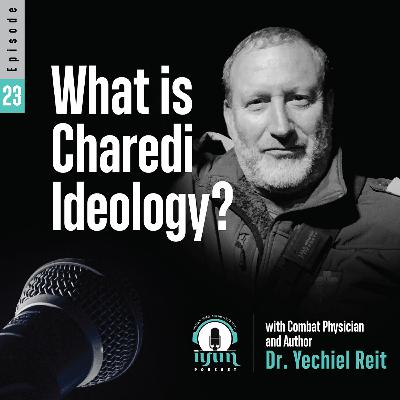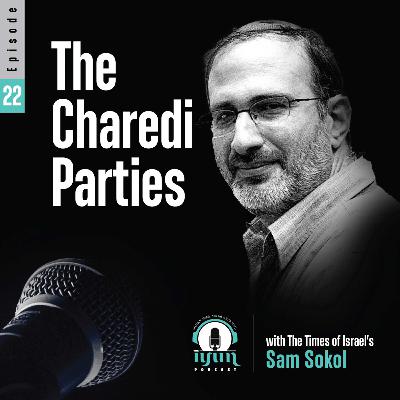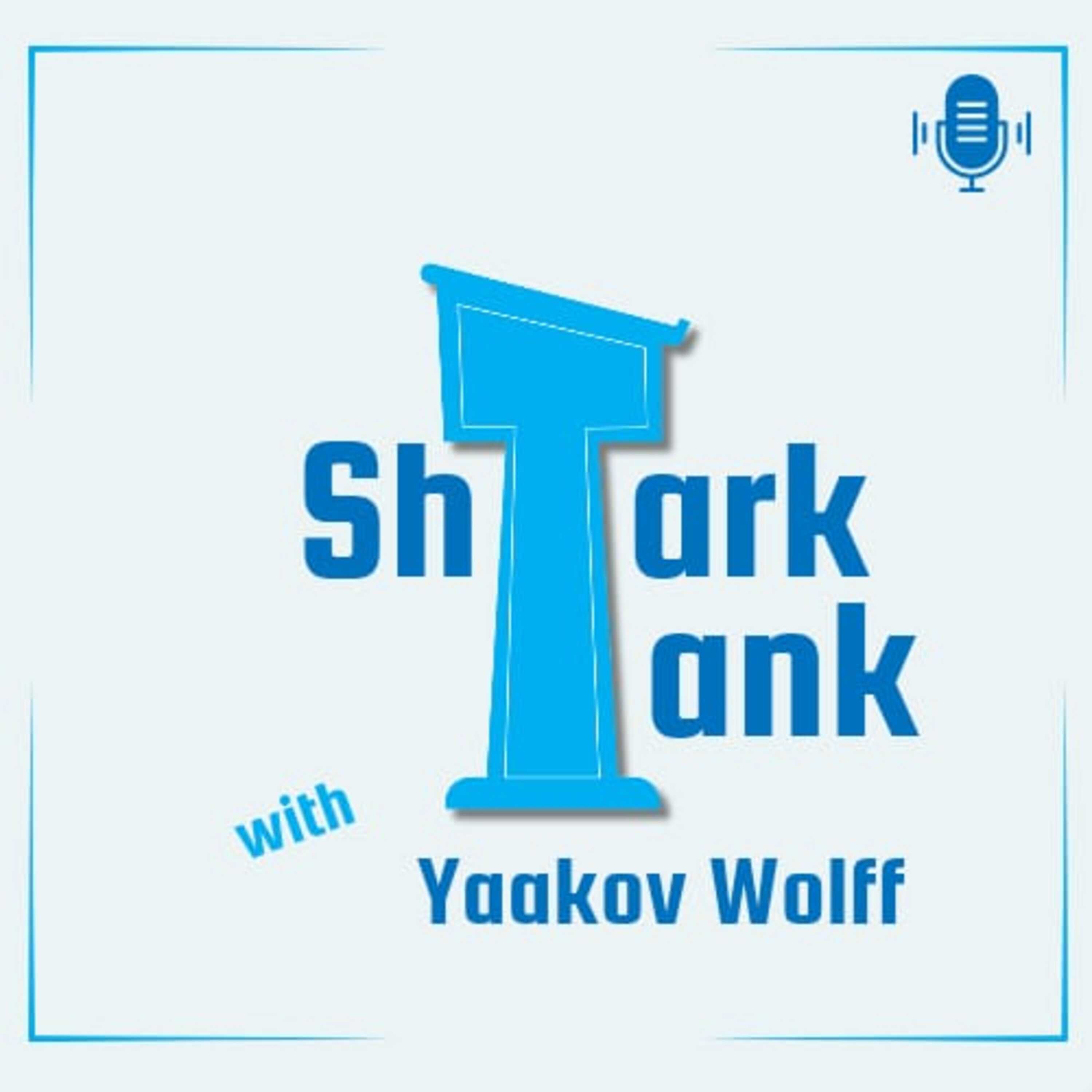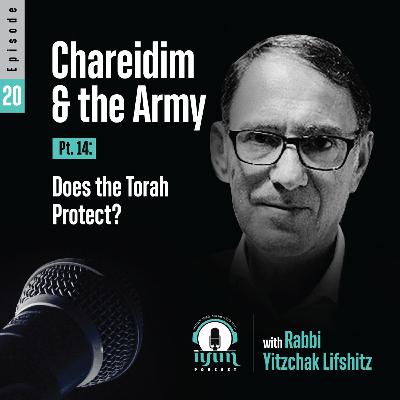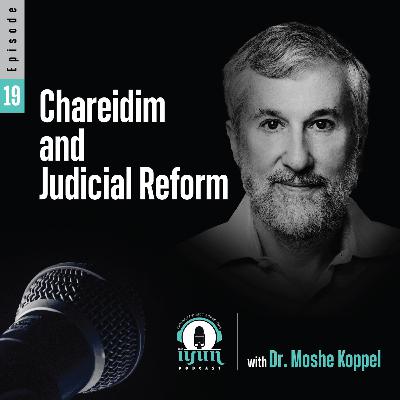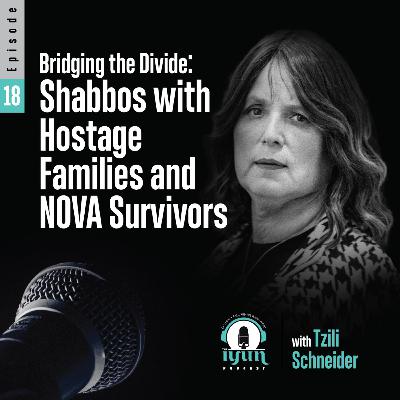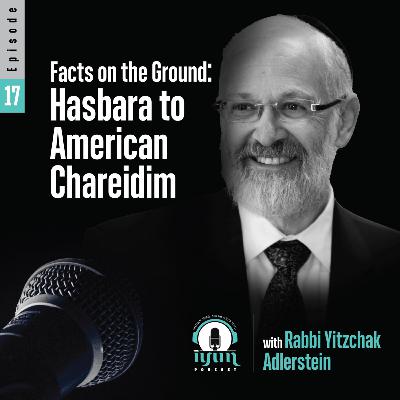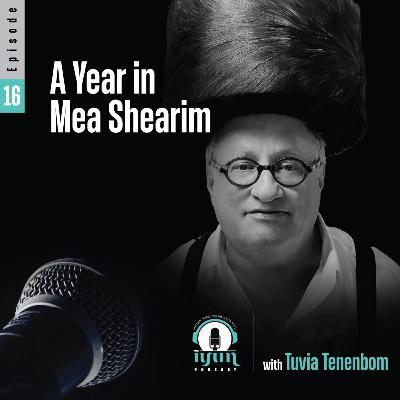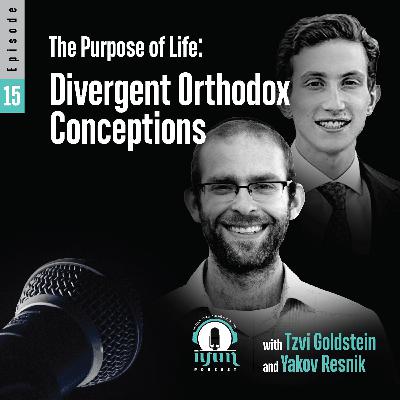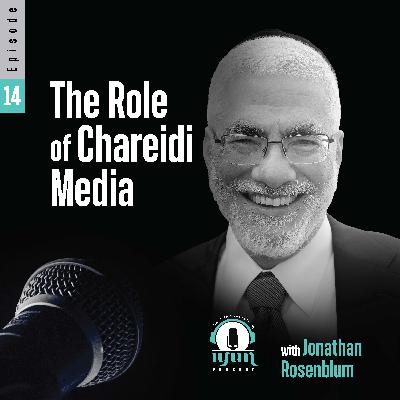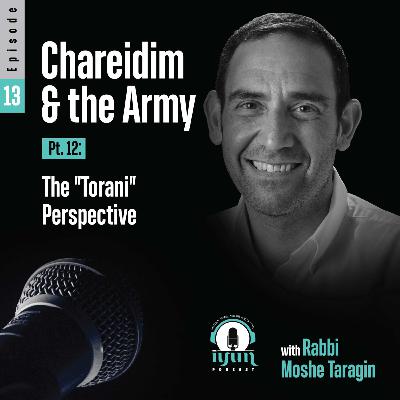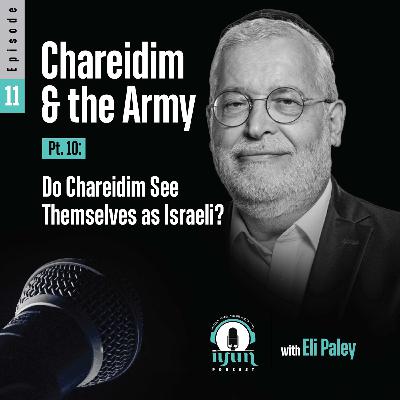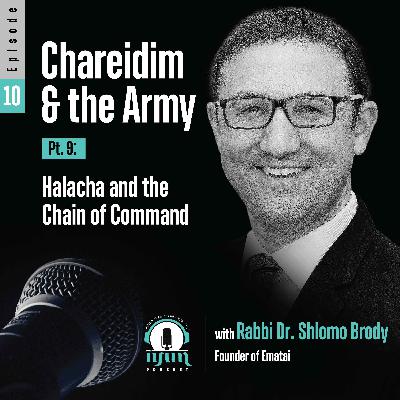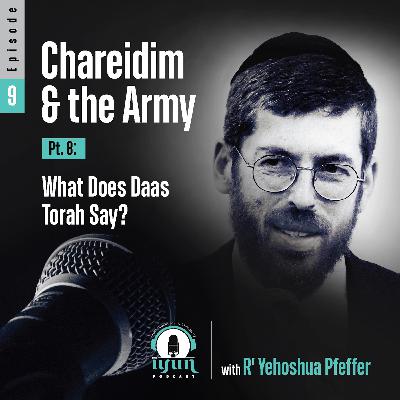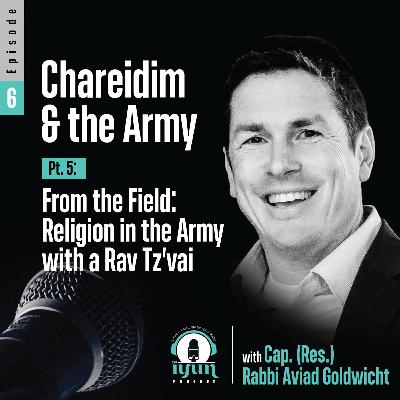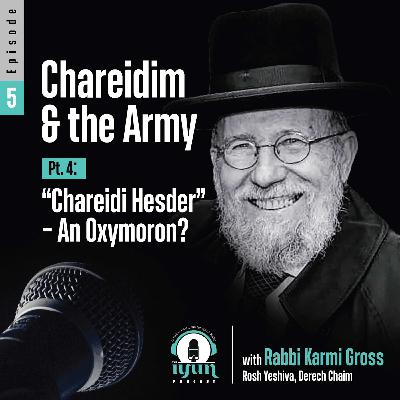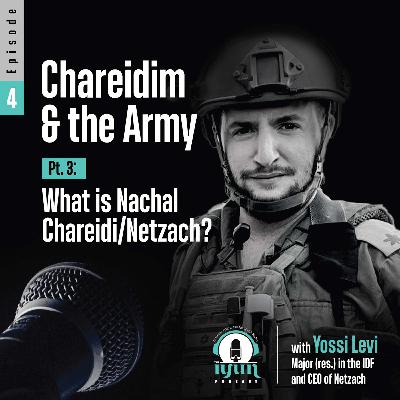Discover Iyun Podcast
Iyun Podcast

Iyun Podcast
Author: Rabbi Ari Koretzky
Subscribed: 11Played: 192Subscribe
Share
© Copyright 2025 Rabbi Ari Koretzky
Description
The Iyun Podcast explores the many dynamics of chareidim in relation to the broader context of Israeli society and beyond. Hosted by long-time podcaster Rabbi Ari Koretzky, Iyun features stimulating and courageous conversations with guests from a diverse range of stakeholders in the future of chareidi society. Join us on this exciting new adventure in Jewish podcasting!
23 Episodes
Reverse
Dr. Yechiel Reit is an American-born emergency medicine doctor, an IDF reserve combat physician and the author of "Applied Monotheism: The Chareidi Response to Modernity."In our wide-ranging conversation, we discuss Dr. Reit's IDF experience and his analysis of "Charediism," as he argues for an ideological, not cultural, definition.
Sam Sokol is a veteran journalist, currently the Knesset Affairs correspondent at the Times of Israel. In this episode, we explore his journalistic background, and his unique perspective on the charedi parties in the landscape of Israeli politics.
After a long hiatus, we return with a crossover episode - Yaakov Wolff, host of the Shtark Tank podcast, interviews Rabbi Yehoshua and Rebbetzin Tamar Pfeffer.More original episodes to come shortly!
Since inaugurating this podcast, and focusing a long series on charedim and army service, one episode has conspicuously been missing: a full treatment of the halachic parameters of the notion of milchemes mitzvah, as well as an analysis commonly advanced ideals such as "Torah magneh u'matzleh" ("Torah study protects"). In this episode we remedy that void and address these issues that are vital to any Torah-centered Jew.To do so, we speak with Rabbi Dr. Yitzchak Lifshitz, a noted rav and rosh Kollel based in Yerushalayim, who has written extensively on these topics in recent months. Rabbi Dr. Lifshiftz is also a professor of philosophy at Shalem College.
Dr. Moshe Koppel is a leading computer scientist in Israel, with a specific expertise in AI. But over past twenty years he has led an intellectual movement promoting judicial reform within Israel.Through his Kohelet Policy Forum, Dr. Koppel researches alternatives to the entrenched judicial dynamics, and advocates for what he considers a more balanced and democratic approach, in line with other Western countries. Obviously, this topic has been at the center of stormy debates and protests in Israel; while it seemed to subside in the wake of the October 7th tragedy, this issue has returned to the foreground, with broad implications for swaths of Israeli society, perhaps most notably, the chareidim.We speak today with Dr. Koppel about the history and intellectual perspective of this movement, how and why it seemed to unravel, and where the typically non-ideological and narrowly focus charedi public fits in to the story.
Tzili Schneider has created one of the most remarkable bridge-building educational operations in Israel, Kesher Yehudi. Ari Koretzky has previously interviewed Tzili on his other show, Jews You Should Know.Relevant to the Iyun Podcast, however, we focus in this episode on Tzili’s recent efforts with hostage families and NOVA survivors; she has engaged each of these populations with Shabbatonim and other outreach methods, resulting in a significant Jewish awakening fostering deep bonds of mutual love.
The charedi communities of the United State and Israel are separated physically by an ocean, but culturally and psychologically by a great deal as well. Many Americans lack basic awareness of current developments on the ground in Israel, the actual attitudes towards army service and general integration being promulgated there.The resulting gap leads to widespread misconceptions, and inhibits Anglos from forming fully informed positions.InStep Together is a new grassroots initiative aimed at remediating this state of affairs. Several notable Anglo-Charedi rabbinic personalities have embarked on a “hasbara tour” of sorts, holding intimate, fireside chat-style conversations in various communities. Rabbis Mordechai Becher, Ron Yitzchak Eisenmann and today’s guest, Yitzchak Adlerstein, have directed their time and talents towards helping thoughtful charedim around the United States grapple with these issues of grave importance.
Tuvia Tenenbom is quite a colorful character. An author, playwright, mathematician, computer scientist, and all-around polymath, Tuvia was raised in a chareidi Israeli home, in the lap of the Chazon Ish, Rav Shach and other great luminaries. His own life veered on a different course, but he recently returned to those ideological precincts, spending a year in Mea She’arim, Jerusalem, fully immersed in the local community.The product of his embedded travels is the book, “Careful, Beauties Ahead: My Year with the Ultra-Orthodox,” an honest and largely flattering portrayal of his time in an otherwise closed society.Tenenbom highlights many of the gifts - fervent religiosity, principled living, embrace of charity and family - that animate chareidi life, yet which so few Israeli “outsiders” ever learn about, much less witness.In an era of intense polarization,Tenenbom’s tome is a reminder that, for all the critique and calls for chareidi reform, the core values must be preserved, radiating out towards the entire Jewish nation, and beyond.
Why are we here? What’s it all about? Obviously, Judaism has quite a bit to say about this topic. In fact, it may be its entire animating essence!Still, as expressed in contemporary living, even those who identify as strictly Torah-observant may respond divergently to this most-important question.On this episode, Tzvi Goldstein will argue that the Chareidi mindset on “the purpose of life” is orientated towards a Next-World (Olam Ha’Ba) perspective, built on a mystical approach popularized by Rav Chaim of Volozhin.Goldstein himself favors what he classifies as a more “centrist”, “This-Worldly” approach, championed by Rav Hirsch and Rav Soloveitchik.Yaakov Resnick pushes back, adding nuance and sophistication to the presentation of Charedi hashkafa, and muddying the picture, just a bit.Stay tuned for our host’s own take at the end of the episode.This conversation was inspired by an article penned by Goldstein on the pages of online publication The Lehrhaus, provocatively titled “Rack up Those Mitzvot,” to which Resnick (along with others) responded with a letter to the editor. (See past Iyun guest Chaim Goldberg’s letter as well.)Yaavov Resnik prefers a lower profile, but for more from Tzvi Goldstein, check out his book, Halachic Worldviews. This unique work explains the background for the "centrist" approach to Torah learning, and offers more than a dozen examples of halachic topics that might be evaluated through the lens of “Torah values.” Tzvi authors a wonderful Substack as well. Give him a follow!
Jonathan Rosenblum is a long-time columnist, pundit and observer of the Orthodox/chareidi communities in Israel and worldwide. He joins us on this episode to explore the unique role and purpose of chareidi media.His wonderful new volume, “Ordinary Greatness,” a compilation of many columns, and more, is available for purchase wherever great Jewish books are sold.
Rabbi Moshe Taragin is a long-time Ram at Yeshivat Har Etzion (“The Gush”), as well as a popular speaker and author on a wide variety of Torah topics. A student of Rav Aharon Lichsteinstein, zt”l and Rav Yehuda Amital, zt”l, R’ Taragin absorbed their weltanschauung over many years.In this episode, we ask him to sketch out, for the uninitiated, the “Dati Leumi” community in which he lives and teaches. Many people beyond this large and vibrant society may be unaware of the variegated options therein, or of just how serious and committed are many of its adherents to limud ha’Torah and shmiras ha’mitzvos. Hopefully, this show can offer a modest corrective to that reality.R’ Taragin speaks with great humility and ahavas Yisroel, and all of his works are well worth our listeners’ attention. Hear some of his classes here and here. And purchase his powerful book about faith post-October 7th, Dark Clouds Above, Faith Below.
In his role as founding director of the Haredi Institute of Public Affairs (HIPA), Eli Paley is well positioned to evaluate the chareidi relationship to Israeli society.As Iyun founder Rabbi Yehoshua Pfeffer has written, the most vital factor in the entire chareidi conscription conundrum may just be whether, or to what degree, chareidim see themselves as “Israeli.” In this wide-ranging conversation about chareidi identity, we tackle these questions and aim to decipher the trends at play in current society.
One of the under-appreciated concerns - sometimes articulated, often unconscious - held by Chareidim with respect to army service, is the concept of “chain of command.” For a young man whose guiding force in life is G-d, the Torah and rabbinnic authority, submission to faceless officers high up the IDF’s ladder can seem sacrilegious.This is compounded when considering possible halachic matters of life and death: who is authorizing actions that place soldiers’, and others’, lives at risk? Are these decisions guided by Torah principles in any sense?Rabbi Dr. Shlomo Brody, founder of Ematai, and author of the recently-released instant-classic Ethics of our Fighters, joins us to explore these vexing issues.
“Daas Torah.” These two words are among the most loaded in modern hashkafic - and political - discourse. But what, in fact, does it mean, and how might it apply to the current crisis over chareidi conscription, whatever one’s view of the matter? It would be presumptuous to attempt to treat the topic of Daas Torah comprehensively on one episode of a conversational podcast. One is referred to Lawrence Kaplan’s classic article on the matter, and many other sources, for this more holistic treatment.Instead, we evaluate how this contention is marshaled within the current discourse around Chareidim and army service. Rabbinic opposition often is cited as the most substantial argument against participation. This impulse is deeply embedded in the charedi psyche, and one can argue that this is with good reason: after all, on matters of legitimate communal guidance, who is more qualified to issue directives that will preserve societal commitments and observance?On the other hand, in today’s landscape, many people seek more transparency and wish to debate the issues on their merits, without recoursing to an “argument from authority.” Furthermore, students of even recent history wonder when this issue became so monolithic, and extreme.This fascinating article explores charedii military participation during the War of Independence. Telz Rosh Yeshiva Rav Elya Meir Bloch attended a communal Yom Ha’atmaut celebration in Cleveland in 1954. And consider these statements, cited in a Tzarich Iyun article by Iyun founder Rabbi Yehoshua Pfeffer, made decades ago by the greatest sages of the previous generation:Rav Elazar Shach (1980 letter on behalf of Vaad Hayeshivos): “The right given to yeshiva students of deferring their enlistment into the army, is contingent on his study being his sole occupation. He must not be engaged in any material pursuits, whether during yeshiva hours or outside of them.” Rav Yechezkel Abramski: “Anyone who “abuses this right, is considered a rodef (a “pursuer”) of those yeshiva students who study Torah diligently.” And he instructed Roshei Yeshiva “to conduct a strict vetting of students and remove from their ranks any student whose Torah is not his sole occupation.”The Steipler (in Orchos Rabbeinu): “Those who are registered in yeshiva, allowing them exemption from the army even as they engage in gainful employment, are absolute rodfim.” To be sure, none of these quotes imply a pro-army stance for full-time yeshiva students; quite the opposite. Still, they do reflect a willingness - even responsibility - to reserve this exemption for those most deserving. (And of course, while many opponents would still decry such privilege for full-time learners, a stance that demands army service for all non-learners would be welcomed in our moment by most Israelis, and reflect a far more liberal position than currently espoused.)So…in a society that seems to have grown only more traditional, why has the chareidi community grown more resolute and isolated? Why has the Daas Torah changed? Or is all not as it appears?We will attempt to unravel some of these questions on this episode. ---------------Link to Outro reference:
On May 26th, 2024, the Iyun Institute co-presented a special symposium with The Israel Law and Liberty Forum, titled "Chareidim, the Draft & the Law: Where Do We Go Now?" The panel, moderated by ILLF Executive Director Mrs. Aylana Meisel-Diament, also featured Iyun's own Rabbi Yehoshua Pfeffer, as well as Prof. Ron Shapira (Bar Ilan University) and Prof. Barak Medina (Hebrew University).As a part of our ongoing series on Chareidim and the Army, we present this symposium, lightly edited, for your enjoyment in podcast form.
Rabbi Eliyahu Chait, the youngest child of famed rabbi, author and singer-songwriter Rabbi Baruch Chait, is making a mark of his own. An IDF alumnus of Netzach, R' Eliyahu recognized a need for a post-army framework servicing young men from chareidi backgrounds with serious Torah learning and options for "re-entry" into civilian life. Kochot, his nascent organization, is offering authentic Torah-based experiences to those who have sacrificed for the People of Israel, as they chart a course for the rest of their lives.KOCHOT'S WEBSITE: https://lp.we-be.co.il/kochot/KOCHOT on YouTube: https://youtu.be/gzT_Uq775Y4?si=_cilGPsZzDsoj8b6Struggling after service? Help us empower Orthodox veterans. Many young Orthodox men returning from the IDF find themselves grappling with their faith and unsure of their path forward. KOCHOT, a Jerusalem-based program, is there for them. We provide these veterans with the support they need to rebuild their connection to Judaism and navigate life after the military. Through a strong spiritual foundation and practical guidance, KOCHOT helps them find meaning and purpose in their civilian lives. Your donation can make a difference. Help us empower these brave veterans as they transition to the next chapter. Donate today! https://checkout.square.site/merchant/ML7PCN6QEN3QX/checkout/FPRO5FLJF6A7F2MYAEVE76K7?src=webqr
On this episode, two wonderful, "regular" yungermen - each a talmid chochom of stature who has thought and written considerably about this subject - join us for an "Oxford-Style Debate" (sans the audience).Today's proposition: "The time has arrived for many more chareidim to begin to draft to the army."R' Chaim Goldberg is an educator, clinical psychologist and author.Jewish Press Article: https://www.jewishpress.com/indepth/opinions/the-idf-a-torah-true-calling/2024/04/12/Substack ("View From Jerusalem"): https://chaimgoldberg.substack.com/Rav Aharon Lichtenstein on the Ideology of Hesder: https://traditiononline.org/the-ideology-of-hesder/R' Mordechai (Mordy) Twersky is an educator and scholar in Har Nof, Jerusalem, Israel.Brief monograph on Chareidi opposition to army service: https://docs.google.com/document/d/1xYDEKI7DjfXBzhNR_QXz8KomWURliPkqeg4lqJgc85E/edit?usp=sharing
Rabbi Aviad Goldwicht is a business professional and Torah teacher who also serves as a rabbinic chaplain in the Israel Defense Forces. Since October 7th he has been servicing soldiers and engaging in extremely taxing and holy work.
Rabbi Karmi Gross, son of legendary Miami day school founder Rabbi Alexander (Sender) Gross, is a pioneering educator and Jewish leader. A founding rebbe at Yeshivat Maarava, then a principal at day schools in Vancouver, Detroit, and Los Angeles, he finally returned to Israel to found the first Chareidi Hesder yeshiva: Derech Chaim.On Episode 5 of The Iyun Podcast - and Pt. 4 of our mini-series on Chareidim and Army Service - we speak with Rabbi Gross about his background, and this groundbreaking project.Yeshiva Derech Chaim: https://www.derechaim.com/en/our-staff/
Chareidim & the Army (Pt. 3): What is Nachal Chareidi/Netzach?In Episode 4 of the Iyun Podcast - and Pt. 3 of our mini-series on Chareidim and Army Service - we begin exploring various frameworks that currently exist to absorb those chareidim seeking to draft into military service. We begin with what is known as Nachal Chareidi, or Netzach Yehuda (now Netzach). These two are often conflated, although actually they are related but not identical institutions.We speak with CEO Yossi Levi about these programs, how they are actually constructed, how they differ from other IDF units, and the future of this enterprise.Learn more about Nachal Chareidi and Netzach at https://nahalharedi.org/


